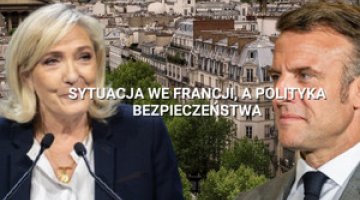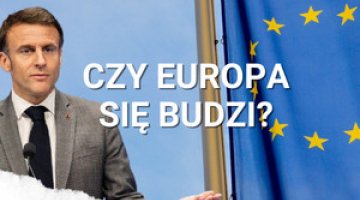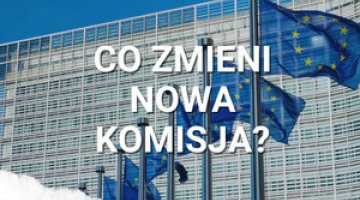Further EU sanctions against Russia
On 1 August, a regulation by the Council of the European Union brought into force the third – and so far the broadest – package of sanctions, which covers selected sectors of the Russian economy and a list of companies and individuals associated with the Russian ruling elite. The limited scope of EU sanctions and the introduction of a number of exemptions mean that their direct impact on the Russian economy will not be significant. However, they do strike at several Russian oligarchs associated with the ruling camp. The sanctions will also contribute to a further deterioration in trust in Russia on the international stage, and will reduce its attractiveness to foreign investors. They will thus deepen the macroeconomic problems of Russia, which have been observed over many months: a decline in GDP growth, a weakening of the rouble, rising inflation and increased capital flight.
The Russian authorities reacted to the sanctions and criticism from the West by imposing an embargo on imports of selected commodities and agricultural products from the EU and other Western countries on 7 August. The government has also launched a media campaign dismissing the impact of the sanctions, highlighting Russia’s resistance to external interference and announcing import substitutions. This rhetoric has had a decisive influence on the public mood in Russia; at this stage the majority of the general public are downplaying the effects of the sanctions and the international isolation of Russia, believing that the sanctions will only affect the elite and will not be felt by society at large.
The range of sanctions
The EU economic sanctions which came into effect on 1 August were introduced in response to Russia’s destabilisation of the situation in Ukraine. An additional cause was the shooting down of the Malaysian aircraft, blamed on pro-Russian separatists in eastern Ukraine, which horrified European public opinion.
The sanctions have limited the access of the five largest Russian state-owned banks (Sberbank, Rosselkhozbank, VTB, Gazprombank and VEB) to the European capital market. The prohibition applies to trading in securities and other money market instruments issued after 1 August with maturity over 90 days, and also covers any services on their behalf (for example, carried out by brokers). However, the sanctions do not prevent Russian banks from taking out loans in European financial institutions. Nor do they cover the subsidiary companies of Russian banks registered on European Union territory (Sberbank, VTB and Gazprombank).
The sanctions also cover selected sectors of the Russian economy. The prohibitions apply to the supply of machinery and equipment and selected technologies to the oil sector, the supply of arms and military equipment, as well as certain goods and dual-use technologies. However, they do not include imports by EU countries of arms and weapons from Russia.
The EU sanctions against individuals have also been expanded. The list includes four government officials, including the deputy head of the Kremlin administration Alexei Gromov; and four businessmen from President Putin’s inner circle: Arkady Rotenberg, Yuri Kovalchuk, Nikolai Shamalov and Konstantin Malofeyev (at present, the list includes 95 persons in total). The sanctions also cover three companies: the low-cost airline Dobrolot (a subsidiary of Aeroflot) which flies to Crimea; the Almaz-Antey arms company, and the Russian National Commercial Bank, which operates in Crimea.
How severe are the sanctions?
Restricting Russian banks’ access to Western capital markets will not have any significant financial impact over the coming months, since they have the means to repay the majority of their liabilities. If the sanctions are continued, though, problems may arise in 2015 and beyond, when the biggest repayments on earlier loans and redemption of bonds fall due. State-owned banks which are deprived of external financing will seek to mobilise additional financial resources on the domestic market, relying on help from the Ministry of Finance and the Central Bank; the latter has already declared that it will provide the necessary financial support. Russian foreign exchange reserves, amounting to US$480 billion, may also be drawn upon to support the state-owned banks.
Problems with debt obligations will also arise for Russian energy companies, which account for 72% of the debt. For example, over the next two years Rosneft needs to pay off around US$50 billion, and Gazprom around US$30 billion. The growing threat that European banks will refuse to grant new loans may require the freezing of some investment projects, which will affect future production levels. But energy companies can count on financial support from state reserves, as happened in previous years of crisis. Much greater problems with refinancing debt will be encountered by indebted private Russian companies and banks. Limited access to external and internal financing, as well as the growing cost of obtaining loans, could force reductions in manufacturing, the sale of some assets, or even the bankruptcy of certain entities (over the next 12 months, private companies have to repay US$67 billion and private banks US$20 billion).
The EU sanctions in specific sectors are rather limited. In the petroleum industry, these include a ban on the sale of selected technologies for deep-sea oil drilling, oil shale acquisition and exploration on the Arctic shelf, which should be considered as future projects. The sanctions do not cover the refinery, petrochemical or gas sectors, including LNG projects. At the same time, the regulation by the Council of the European Union allows for continued cooperation and supply on the basis of contracts and agreements signed before 1 August, based on permits issued by authorised national institutions. Deliveries of equipment and dual-use technologies, and the provision of technical and financial assistance for the Russian defence sector (for example, the contract to supply Mistral amphibious assault ships) which were contracted before 1 August can also be continued on the basis of individual licenses. This limited range of sanctions is intended to be a warning to the Russian authorities against further escalation of the conflict in Ukraine, rather than representing any real desire to break trade relations with Russia – which remains a major recipient of machinery, equipment and technology, and on the other hand is a supplier of energy (particularly natural gas) to the EU countries.
Russia’s falling economic credibility
The EU’s sanctions, which follow the earlier and more decisive American measures, come on top of Russia’s macroeconomic situation, which has been deteriorating for many months, much like its image in the international arena. This spring Fitch downgraded Russia’s credit rating from stable to negative, and Standard & Poor’s from BBB to BBB-, the lowest investment grade level. In addition, the G7 has urged the World Bank to suspend financing for new investment projects that were to have been implemented in Russia (nine investment projects for a total amount of US$1.34 billion). Uncertainty as to the further development of the political situation has also pushed down Russian companies’ stock indices and brought about a surge in capital outflow from Russia. In the first half of 2014, this has amounted to US$74.6 billion, and was higher than the figure for all of 2013 (US$62.7 billion). It is predicted that by the end of this year the total outflow could far exceed US$100 billion.
Russia’s policy over the last six months has contributed to the suspension of the implementation of certain foreign contracts, for fear of increasing the financial and political risk. For example, Germany’s Federal Ministry of Economics blocked Rheinmetall’s contract to participate in the construction of a modern military training centre in Russia which would have been worth €100 million. European exporters are also experiencing difficulties caused by the weakening of the Russian rouble over the last few months, reducing their Russian partners’ purchasing power. The new necessity to obtain a permit for exporting goods covered by the sanctions to Russia would pose another problem for them.
Reducing the credibility of Russia and treating it as a high-risk country will also change foreign attitudes towards Russian private business, especially towards businessmen from President Putin’s inner circle. The Western sanctions cover key Russian oligarchs (Gennady Timchenko, Yuri Kovalchuk, the Rotenberg brothers et al.) who have suffered tangible financial losses. In recent months, Timchenko has been forced to sell the majority of his assets in Europe, and the European Commission barred Stroytransgaz, the company he runs, from participating in the construction of the South Stream pipeline on the territory of Bulgaria. In turn, after the US introduced sanctions in March against the Rossiya Bank, controlled by Yuri Kovalchuk, VISA and MasterCard ceased to honour the bank’s credit cards around the world. As a result, the bank lost a third of its deposits (around US$360 million) and is currently conducting operations in Russia alone, and only in roubles (through the Sberbank payment system). An additional problem for Russian business is the attitude of Switzerland – an important European financial centre – which under the influence of EU sanctions has restricted the access of Russian individuals and several Russian entities to their banks.
The sanctions’ political and social context
The Kremlin’s confrontational attitude towards the West means that we cannot expect the sanctions and the economic effects of the deterioration of Russia’s image to alleviate its political course in the short term. In retaliation for Western sanctions, on 7 August, at President Putin’s order, the Russian government introduced a one-year embargo of selected groups of commodities and agricultural products from most of the countries that have imposed economic sanctions on Russian companies amd individuals. Moscow has also warned it could ban flights over Siberia for European carriers.
This is accompanied by media coverage which plays down the impact of Western sanctions and highlights Russia’s resistance to external interference. Pro-Kremlin commentators and the media have been outdoing one another in trying to identify alternative sources of supply of goods and the possibility of obtaining loans in Asian countries, such as China. The media have also stressed the economic potential of Russia, which will allow the replacement of many of the imported goods, including in the defence sector, the chemical industry and the agricultural and food industry; this in turn could stimulate Russia’s economic growth. Within the context of the conflict between Russia and Ukraine, Moscow had already taken action to replace imports from Ukraine in the defence sector (for example, the Russian Klimov corporation has begun to produce engines for helicopters).
The message of the Kremlin seems to be having a decisive impact on the public mood at this stage; polls show that the majority of society is downplaying the effects of the sanctions and international isolation of Russia, while expressing the belief that they affect only a narrow circle of the Russian elite (according to a Levada Centre poll of 29 July). This confirms that at the moment the public is continuing to consolidate around President Putin, who earned a great deal of social credit from the annexation of Crimea.
Cooperation: Konrad Popławski




